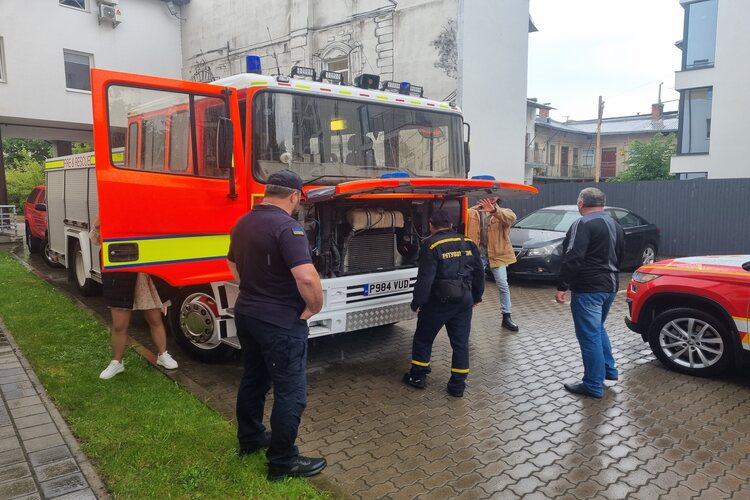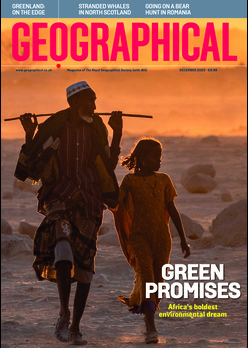
Nick Redmayne’s incredible 3,400km journey to donate a fire engine to Ukraine is complete, offering insight into life in the country
by Victoria Heath
Back in May, Geographical interviewed regular contributor Nick Redmayne about his efforts to deliver a much-needed fire engine to Ukraine.
Now, Nick has completed the four-day, 3,400-kilometre journey, travelling from Newcastle to Lviv to hand over the fire engine to the Ukraine Fire Service. Named ‘Marjorie’ after Nick’s late mother, the fire engine was driven by Nick and a co-driver, Scott, to Lviv, after Nick purchased the vehicle from a generous collector of emergency vehicles with donations raised earlier this year.
The fire engine was supplied for a discount price of £5,000, saving £2,500 on market value.
The ‘Marjorie’ fire engine’s journey from Newcastle to Ukraine
‘The ‘journey’ began long before Marjorie hit the road, with the fundraising campaign,’ explains Nick. ‘Initially, the most difficult obstacle encountered was my chosen funding portal, GoFundMe. Following the launch of my campaign and without much coherent discourse, GoFundMe decided to cancel and refund all donations on the basis that a fire engine fell into the category of ‘war supplies’ and was, therefore, contrary to their operating statute.’
Fortunately, donations were then raised via JustGiving.com, as well as direct donations made after Nick gave illustrated presentations locally. After raising the funds required to purchase the fire engine, it was time to head to Ukraine.
On 22 May, ‘Marjorie’ boarded a ferry in Newcastle heading towards Amsterdam. After travelling out of the city of IJmuiden in the Netherlands, Nick and Scott continued onwards, arriving north of Hanover, Germany.
Only a few days after setting off from Newcastle, Nick was seen lying beneath the underbelly of Marjorie in an Instagram post. In a video posted to social media, Nick describes how Marjorie was forced to stop after facing mechanical issues and losing power heading uphill.
Attempting to diagnose the issue remotely, Nick liaised with Bruce Henderson, a mechanic who knows the vehicle intimately back at home.
Eventually, the vehicle was on the move again, heading towards the Poland-Ukraine border where many other trucks waited to cross. After a lengthy eight-hour wait, ‘Marjorie’ passed through into Ukraine. Nick counts himself lucky, with some truck drivers taking 16 hours to get across the border.
Arriving in Lviv, the location where Nick and Scott’s hotel was supposed to be was barren, meaning the pair slept in a cab and on public transport instead.
Eventually, Nick handed over the fire engine to the Ukraine Fire Service, an exchange faciltated by Help 4 Ukraine. The vehicle then continued her journey to the city of Zaporizhzhia, where representatives from the fire service said she had a job to attend to.
”Marjorie’ is a fully-functional fire appliance with a large crew cab, full ladder set and a surprisingly quick turn of speed. Her onboard reservoirs, both water and foam, and powerful pump, add a capability to attend and confront fires quickly,’ Nick says.
Nick’s first-hand experience of Ukraine
After donating the fire engine in Lviv, Nick describes his experience of the city.
‘There was very little to suggest that Ukraine was a country involved in a war, perhaps other than the lower floors of buildings converted into air raid shelters. Wandering around the city during the day, Lviv felt like a very vibrant European city. It was full of young people, lots of energy and cultural events going on with a full program at the Lviv National Opera House.’
Nick then travelled onwards to Kyiv, reporting on life in the capital through his Instagram. Capturing poignant events such as a military funeral, as well as videos of young people sat relaxing outside, Nick offers an encompassing glimpse into life in Kyiv. He speaks of warm summer days with blue skies, as well as people outside on Kyiv Day, celebrated on 28 May.
But there are also stark reminders of a country currently at war.
‘For a while most in Kyiv ignored the air raid sirens, preferring to stay at home or even in the pub,’ he says. ‘Everybody has an app on their phone. I have it, and it tells you there’s an air raid and to head to the shelter. People might glance at their phone, look up at the sky. Then just carry on. But the daytime air raids last month changed that, temporarily at least,’ says Nick.
While Nick was walking through Khreshchatyk, the main street of Kyiv, to get breakfast, he experienced a daytime air raid first-hand.
‘There were some really loud explosions, and about six or seven air defence missiles shot off through the sky and intersected something not far overhead, by which point everybody had scattered. I was watching from the steps going down to the metro station, and people were running to get down to the metro station underground. Even when I judged myself that it was okay, I came out and walked back up the hill, and still people were running down the streets for the metro.’
While in Kharkiv, just 18 miles from the Russian frontier, Nick had little warning of air attacks. Electricity was infrequent and generators were cranked up to compensate.
In Kharkiv, Nick describes seeing overt signs of conflict, although emphasises that rebuilding is underway. Despite several huge buildings in the city being boarded and empty, businesses are open. He shows the bustling exterior of the Nikolsky Mall, with shoppers and cars around its entrance. Lush, neatly-cut grass in Shevchenko City Gardens are surrounded by colourful flowerbeds, and Nick was even served a craft IPA beer from Dnipro.
‘Things which are very abnormal are accommodated by ordinary people. Folks just get on with their lives,’ he says. ‘In Kharkiv, the metro is operating for free at the moment, as it’s a safe way of getting around. Little shops and restaurants are open.’
‘I’ve visited Ukraine three times since the Russian invasion. Sometimes it’s been quite a surreal experience,’ says Nick. ‘I remember in November 2022 being in Kyiv during a cruise missile attack. I’d heard the sirens but initially thought the loud sounds I was hearing were lorries passing over uneven road, until the last two explosions forced a little air from my chest. Then the electricity, water and internet went off. Late the same morning, under brilliant blue skies, men from the municipality were out in central Kyiv clipping hedges and sweeping up leaves.’
After leaving Ukraine once the fire engine was donated, Nick travelled to Moldova, a 17-hour-long train journey from Kyiv to Moldova’s capital, Chisinau, before flying back to Newcastle via Dublin. On the train to Chisinau, he met a young woman with a baby, alongside her mother.
While talking, Nick discovered that the family were on their way to fly from Chisinau to Cyprus for a holiday, after the young woman’s husband died in battle.
‘I would say she was still in some kind of shock. It was only in April that this has happened, and I met her on the train at the beginning of June.
‘I think she cried all her tears. She looked at me very directly, and just told me that my husband died. He was killed. She told me that we’ve just got lots of things to organise. And now we’re just going to get away. We don’t really know where we’re going, just a beach in Cyprus that will be good for the baby.’
Nick’s future plans
Previously, Nick has journeyed from Northumberland to Jordan in 2011, donating a car to Action Against Hunger. In 2018-19, alongside a colleague, Nick drove down West Africa in a former British Transport Police 4×4, crossing the Sahara to Bamako, Mali and raising almost £8,000 for the British Heart Foundation and other causes.
When asked about any future endeavours in charity work after donating ‘Marjorie’, Nick seems hopeful that he will return to Ukraine to offer help.
‘It turns out that we collected a little more money than we needed. The final reckoning is still to be calculated, but it’s possible we’ll do another run with a different emergency vehicle before too long.’




